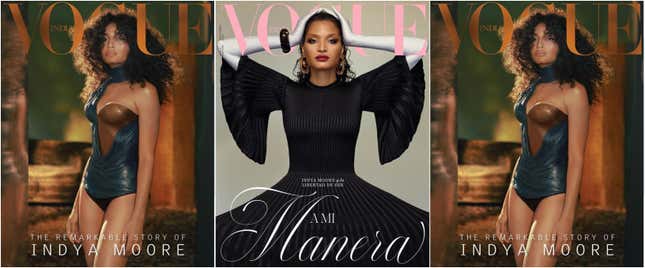
They were the breakout star of FX’s much-beloved (and now, much-missed) Pose, and now Indya Moore is breaking even more ground, creating a double-vision on the covers of both Vogue India and Vogue Spain this November. As is now to be expected by an actor who plays a model onscreen and off, the fashion spreads are stunning, but inside, the 25-year-old remains frank as ever about life as a trans, non-binary person—albeit now an increasingly famous one.
“I am still figuring out my life. I just came out of foster care,” Moore tells Vogue India. “From living in survival mode, I have a set of experiences that I think are helpful to share on behalf of my community with the world, that form the way that I advocate for myself and people like me. But I still feel like I don’t have the grace to be human.
“I find myself in a position where I have to always be vulnerable and share parts of myself. That makes people have too much access to me in a way that doesn’t feel safe,” they continue. “There’s so much that I am trying to learn and figure out, and in such a small amount of time.”
Moore has been an outspoken activist for years, but of course, has been as deeply impacted by the recent anti-racist uprisings as any of us. Their cautious optimism is evident as they tell Vogue India:
I think that this happening [The Black Lives Matter movement] has been affirming at a magnitude. It’s so large, but it’s still not enough for us to get liberated and get free. It’s still affirming nevertheless, because to be Black in America is to be gaslit every day of your life and to gaslight yourself sometimes, to just get by.
Moore further explores this double-bind in Vogue Spain, where they readily acknowledge the pivotal moment their appearance on the cover signifies.
“The only thing that I am clear about is that this is certainly not the cover that the Spanish market expects,” Moore says. “All the people who have spent centuries living on the margins, forgotten and exiled from a supposed normality would not have believed the change that is happening all over the world.
“A Vogue cover may be a simple image for some, but it doesn’t boil down to that at all,” they add, “it’s a message to the world that can be completely empty, or full of content and force. Like everything else, I think only those who want the latter will survive.”
Moore has become painfully aware of the heightened attention that comes with a rising career; in recent months, they have been under scrutiny following conversations on social media about their rumored relationship with fellow activist and influencer Malcolm London, who has both been accused of sexual assault and admitted to past predatory behavior, the accusations also casting a less than favorable light on Moore, who has not publicly commented on the controversy but hinted at it in their interview.
“The only thing I refuse is to be an example of nothing to anyone,” says Moore. “The culture of fame that has been built in the last few decades means that we have the famous as throwaway products instead of people, statues that are not allowed to crack. Having a celebrity role model is highly dangerous because your mistake has a butterfly effect of unknown magnitude. My intention is to represent my community as well as possible, yes, but I refuse that my failures do not determine whether or not I am an acceptable example. Although that means not ascending so fast.”
Ascension does often mean accountability—and Moore’s movement has been marked by a stunning upward trajectory the past few years.
“I feel like I am in a place where I am still also learning for myself, and I think that space is very important,” they say. “For me to have grace is to be seen as a human being that gets to be flawed, gets to be misunderstood, and hopefully, still deserves love.”

